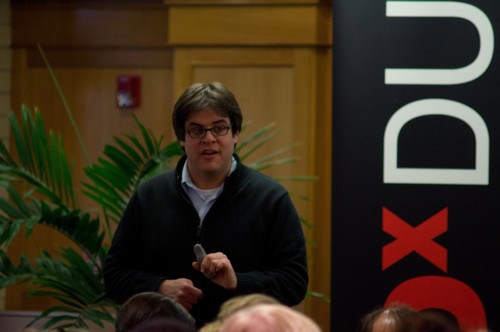 Photo by:
Photo by:
Five speakers called attention to international health and development issues at the TEDxDU Salon in Marcus Commons last Thursday, an event that drew about 125 people.
Two presentations were live talks by faculty and three were broadcast from the TEDxChange event hosted in Berlin by the Gates Foundation. Topics included health care as a medium for social change, affordable sanitation, clean energy and family planning.
This was the ninth TEDxDU event on campus.
The first live talk was by Randall Kuhn, director of the Global Health Affairs Program at the Josef Korbel School of International Studies. His presentation, “How to Start a Revolution,” discussed how health and development contributed to the Arab Spring.
“One of the big returns of health development is that it can lay the groundwork for revolutionary change,” said Kuhn.
In the years preceding the Arab Spring people experienced lower infant mortality rates, longer life expectancies and more university enrollment, according Kuhn said this was due in part to the fact that Arab leaders, like Muammar Gaddafi, invested in health.
“It wasn’t just that they were doing well, it was that everyone around them was doing well,” said Kuhn.
Despite these advances, Kuhn said Arabs could not find jobs and began marrying later in their lives, at ages up to 10 years older than they were 30 years ago.
“What we had was a mass population-wide failure to launch, because their governments let them down,” said Kuhn.
One of the slides in Kuhn’s presentation showed the Arabian proverb, “He who has health has hope. He who has hope has everything.”
Clearly, he said, this wasn’t how Mohamed Bouazizi felt when he set himself on fire to protest police corruption, sparking the first protests of the Arab Spring.
“So why should we invest in health and development?” said Kuhn. “Because it’s the right thing to do. But improving health can also empower young people to change regimes. So if you’re looking for a return on investment from health and development, look no further than the Arab Spring.”
Kuhn’s talk was followed by another live lecture by Renee Botta, associate professor of International Health and Development Communication at DU.
Botta’s talk, “Soap Saves,” addressed hand-washing in Kibera, the largest slum in Kenya.
Botta said her team found one of the largest factors preventing Kiberans from washing their hands was the cost of bar soap, so they taught local woman how to make homemade soap.
It’s a participatory approach,” said Botta. “And it’s an approach that we believe is sustainable.”
According to Botta, over 1.4 million people die each year from poor sanitation.
She said by promoting hand washing, this number could be reduced by 92 percent.
“We could virtually eliminate these deaths,” said Botta.
There were also three talks broadcast from Berlin. Jeff Chapin, a mechanical engineer and product designer for IDEO, talked about installing plumbing in Cambodia. European Parliament member Sven Giegold and event sponsor Melinda Gates talked about sustainable energy in Europe and the importance of providing birth control to women in sub-Saharan Africa and southeast Asia.











